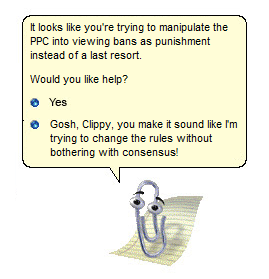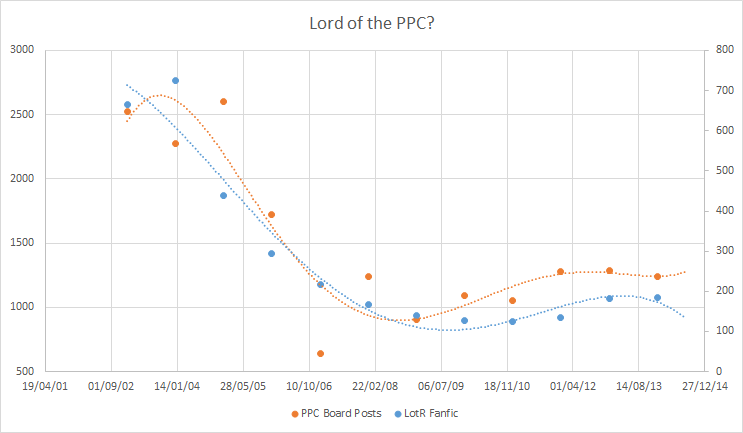[Deep breath] Okay. It's been a week, and it looks like most of the discussions relevant to specific people have died down. We've had the weekend and everything, so... here we go:
The following is a list of individuals and groups who have been identified to me as having/causing potential unresolved issues that may need to be addressed. I have excluded two people over the issues being too far in the past - one for a single 2013 incident, and one for a pattern of behaviour which petered out a year or two ago. I've also excluded anyone who has explicitly left or been permanently banned from the PPC.
I am not saying these accusations are correct. Nor am I saying they are wrong. I am summarising what was presented to me. For each of these, at least one person in the PPC feels that this is a problem that has not been resolved. I am raising them all here so that, hopefully, we don't end up seeing them in people's farewell posts.
I would like to ask that for the first 24 hours of this post's existence, only the people named in it reply. I feel it is fair to allow everyone a chance (ie, a day) to state their own side of the issue before people begin replying to it.
Final note: in the list below, one person has three behaviours listed under their name. This should not be taken to indicate that there is a higher chance of them needing action taken against them, but simply that multiple non-overlapping actions needed covering. In other cases, as many actions were deemed close enough to cover under a single header. It's filing, that's all.
EkylBehaviour for Discussion: It is claimed that Ekyl was asked to beta a specific aspect of a story, but that during the course of writing he extended this to betaing the entire story, and forced the author to incorporate his ideas, including stylistic changes. This behaviour was described several times as bullying.
Actions Taken: Ekyl offered an apology for 'coming off that way'. He did not offer an apology for his actions at any point. He defended all of his actions, at most allowing in some posts that he might have been over-enthusiastic.
Comments from Concilliary: Bad betaing practice is not something that should be subject to discipliniary action. Bullying is a serious problem which has not been dealt with well historically.
Link:
Discussion of Ekyl's behaviourBehaviour for Discussion: It is claimed that Ekyl has engaged in a pattern of manipulative behaviour. Specific comments have been made that his apologies have at times come across as inauthentic/insincere, that his reaction to the accusations made last month (regarding the previous issue above) was disingenuous/did not respect the gravity of the situation, and that he was manipulating the discussion of JulyFlame in the Discord to encourage the witch-hunt while maintaining plausible deniability.
Actions Taken: None, so far as I know.
Comments from Concilliary: 'Backsliding' is possible to forgive if it looks like someone is trying. If you have an issue with an apology, you should address them when it is given.
Link:
This post links to the chat logs, which covers all three of the above points (since one of the apologies highlighted was made in the Discord at the time).
Behaviour for Discussion: It is claimed that Ekyl has repeatedly felt he has the right to intellectual ownership of various portions of the PPC canon/other ideas, and that even when he has not done anything with those ideas, he has taken offence at others doing so, even when there was no way for them to be aware of his perceived ownership.
Actions Taken: None.
Comments from Concilliary: None; most do not accept the abstract idea of this taking place. One comment that if you make a claim of this kind, you need to maintain it or lose it.
Link:
The link from the first point includes an accusation of this, with the posts before and after it including some of Ekyl's thoughts on his relationship to the DIA. It should be noted at this point for context that Ekyl has written relatively little published fiction using the DIA; the only piece I can see is
this one, though there may be more.
Nord RonnocBehaviour for Discussion: It is claimed that Nord Ronnoc engaged inabusive behaviour towards another PPC member some years in the past (possibly before one or both of them joined the PPC), including stalking, emotional abuse, and attempted plagiarism. None of this behaviour is said to have taken place in PPC community spaces; however, Nord Ronnoc is said to have tried to treat it all as brushed under the carpet, and interact in a friendly fashion with the reported victim (without engaging in harassment/stalking).
Actions Taken: Portions of the claimed chain of events were discussed on the IRC, with the reported victim admitting to acting angrily. An IRC moderator attempted to calm the reported victim down. It is not known whether any action was taken against Nord Ronnoc, but it has been stated that they have not apologised. The most recent reported incident between the two took place in 2015.
Comments from Concilliary: This kind of issue should be dealt with on a case-by-case basis.
Link: None, as this is an IRC/elsewhere discussion. As reported to me, Nord Ronnoc has not behaved badly in the PPC itself.
Granz the Ice Cream MonarchBehaviour for Discussion: While the PPC community was discussing banning a number of Discord regulars, including Granz, Granz created a new PPC Discord server to get around the prospective ban. He stated that this was open to everybody, and that it was a response to the ban proposal.
Actions Taken: The server was protested by several people on the Discord, and apparently shut down shortly thereafter.
Comments from Concilliary: Several people feel strongly that this kind of behaviour should be treated as a reaction to events in the PPC, and that those causes should be addressed rather than the attempted splitting of the community.
Links:
This post confirms Granz's involvement. Granz's most relevant comment on motives from the Discord discussion seems to be: "I am trying to say that this kind of mass ban is unjust and also cannot work".
ScapegraceBehaviour for Discussion: It is claimed that Scapegrace has a pattern of behaviour wherein she will engage in bad behaviour (verbal attacks being specifically noted), apologise, but then engage in the same behaviour again after a period without it, with no consequences for this.
Actions Taken: Apologies by Scapegrace after specific incidents, usually very quickly after the incident.
Comments from Concilliary: No-one really calling for disciplinary action; most comments focus on mediation between two people specifically, rather than one individual engaging with multiple others.
Links:
An example from 2015,
and one from this year.
Huinesoron & NeshomehBehaviour for Discussion: It is claimed that they are in some way able to direct the course of discussion in the PPC, including both preventing people they like from being banned, and forcing people they don't like out. It is also claimed that they silence or otherwise stop discussion of issues, preventing their resolution.
Actions Taken: None.
Comments from Concilliary: General feeling that this doesn't happen.
Links: No specific incidents have been pointed out.
This post contains an excerpted Discord log making the claim.
This one makes a related claim
Multiple Discord UsersBehaviour for Discussion: It is claimed that multiple Discord users engaged in a 'witch-hunt' against JulyFlame in the Discord. A group-thinking anti-JulyFlame mentality has been identified several times as a potential cause, as well as a lack of awareness that feelings do not equal facts (ie, it is claimed the approach of "there's no smoke without fire" was taken against JulyFlame).
Actions Taken: Nothing coherent. Yes, there was a
lot of discussion about this, but the subject of bans got taken over by the doxxing discussion. Outside of 'ban everybody', the only proposals were vague things about how people needed to think about what they did. I don't know what discussion there's been on the Discord, but I don't feel that there was any organised discussion of what the behaviour associated with the
witch-hunt (as opposed to the doxxing) brought to light. (I'm saying a lot more words here because it's not as simple a question as the others.)
Comments from Concilliary: A vague feeling that bearing grudges over things that happened years back/that the person has tried to change is bad.
Link: In lieu of linking to the whole discussion,
this is PoorCynic's post where he tries to identify who the drivers behind the witch-hunt were. His list specifically highlights Tomash, Alleb, Granz, Khrssty, Aegis, and Ekyl. I would also like to point out Seafarer's
post here, which cited a troll and
the person behind that troll as evidence against July, which speaks to the confirmation bias/groupthink aspect.
Again, a reminder to please allow 24 hours for the people named to reply. After that point, if you want to step forward as being the/a person who raised the issue, you may (but don't have to); please don't name
someone else as doing so, however.
And no chucking people's personal information around.
hS

